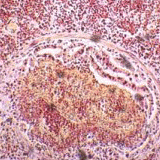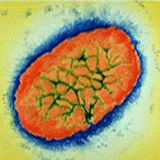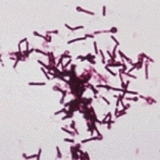Diphtheria
 Diphtheria is an acute and infectious illness caused by the bacteria Corynebacterium diphtheria, which spreads from person to person usually through respiratory droplets. It is characterized by a grayish, thick covering that sticks to the back of the throat or nasal mucosa and can obstruct the airway. Diphtheria is rare in the U.S. since the introduction of the vaccine in 1920s. It remains a concern for inadequately vaccinated people who are traveling in or exposed to infected persons from underdeveloped countries.
Diphtheria is an acute and infectious illness caused by the bacteria Corynebacterium diphtheria, which spreads from person to person usually through respiratory droplets. It is characterized by a grayish, thick covering that sticks to the back of the throat or nasal mucosa and can obstruct the airway. Diphtheria is rare in the U.S. since the introduction of the vaccine in 1920s. It remains a concern for inadequately vaccinated people who are traveling in or exposed to infected persons from underdeveloped countries.
Source: Centers for Disease Control and Prevention
Pertussis
 Pertussis (or whooping cough) is a highly contagious respiratory infection caused by the bacteria Bordetella pertussis, and spreads from person to person through large respiratory droplets generated by coughing or sneezing.
Pertussis (or whooping cough) is a highly contagious respiratory infection caused by the bacteria Bordetella pertussis, and spreads from person to person through large respiratory droplets generated by coughing or sneezing.
Pertussis is characterized by an uncontrollable violent cough that can last for up to 10 weeks. It is common in the United States, with a recent peak in 2012. Infants and young children are at greater risk for complications.
Source: Centers for Disease Control and Prevention
Tetanus

Tetanus (or lockjaw) is a serious but not contagious disease. Spores of the bacteria, Clostridium tetani, are found in soil, dust, and animal feces. When these spores enter the body through a wound, they produce a toxin that impairs the nerves controlling the muscles.
Generalized tetanus typically presents with lockjaw, muscle stiffness and painful body spasms. The fatality rate is approximately 18 percent.
Source: Centers for Disease Control and Prevention
DTaP vaccines are licensed for use among infants in the United States, and are given in a 5-dose series at 2, 4, 6, and 15-18 months, and 4-6 years. DTaP vaccines are often combined with others, such as Hib, Hepatitis B, polio and pneumococcal vaccines. Some are only licensed for the first four doses of the pediatric series.
To reduce the likelihood of transmission of pertussis, a single Tdap dose is recommended for persons aged 11 through 18 years who have completed the childhood series, and for all adults 19 and older, regardless of the interval since the last dose of Td was administered.
Women are also recommended to receive one dose of Tdap vaccine for each pregnancy, optimally during the third trimester, to provide some protection to the newborn through passive immunity until they can be immunized themselves at age 2 months.
You will find below all of the resources you will need about the tetanus-diphtheria-pertussis vaccine. More will be added as they are published or released.
| Information Paper |
Date |
| Tetanus, Diphtheria and Pertussis Diseases and Vaccines |
June 5, 2023 |
| Standing Orders |
Date |
Tetanus Toxoid-Containing Vaccine (DTaP/Td/Tdap) (Pediatric)
|
July 3, 2024 |
Tetanus, Diphtheria and Pertussis (Tdap-Td) Vaccines (Adult)
|
April 9, 2024 |
| Vaccine Information Statements |
Date |
Td Vaccine: What You Need to Know
|
Aug. 6, 2021 |
Tdap Vaccine: What You Need to Know
|
Aug. 6, 2021
|
DTaP Vaccine: What You Need to Know
|
Aug. 6, 2021
|
Your Child’s First Vaccines: What You Need to Know
|
July 24, 2023 |
| Manufacturer Package Inserts |
Date |
Adacel
|
May 11, 2023 |
Boostrix
|
Oct. 27, 2023
|
Daptacel
|
July 21, 2022 |
Diphtheria and Tetanus Toxoid Adsorbed
|
Dec. 20, 2018 |
Infanrix
|
Oct. 27, 2023
|
Kinrix
|
Oct. 27, 2023
|
Pediarix
|
April 26, 2023 |
Pentacel
|
Oct. 21, 2022 |
Quadracel
|
July 21, 2022 |
Tenivac
|
Dec. 16, 2022
|
Vaxelis
|
April 12, 2023
|
| Advisory Committee on Immunization Practices Recommendations |
Date |
DTaP/Tdap/Td Vaccines
|
Jan. 24, 2020 |